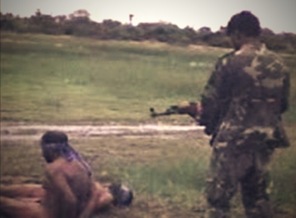 A group of British and Australian Parliamentarians have nominated the controversial Channel 4 video on Sri Lanka for the Nobel Peace Prize, a press statement said on Saturday.
A group of British and Australian Parliamentarians have nominated the controversial Channel 4 video on Sri Lanka for the Nobel Peace Prize, a press statement said on Saturday.
British MP Siobhain McDonagh said that she and Australian Greens Senator Lee Rhiannon have made a joint submission to the Norwegian Nobel Committee nominating the team at ITN and Channel 4 that produced the documentary film ‘Sri Lanka’s Killing Fields’ for the 2012 Nobel peace Prize.
McDonagh said the Channel 4 team produced a timely piece of journalism and brought to light the breaches of international conventions by the Government of Sri Lanka and this has much to contribute to truth, reconciliation and peace for all citizens of Sri Lanka.
She further said that through the nomination of the ITN Channel 4 team for the Nobel Peace Prize, it is also her hope that the world’s attention to the continuing abuse of human rights in Sri Lanka will bring justice and peace to the long suffering Tamils in the island.
The joint submission to the Norwegian Nobel Committee said:
We feel honoured to nominate the team that produced the documentary film ‘Sri Lanka’s Killing Fields’ in 2011 for the Nobel Peace Prize for 2012 , for its outstanding contribution to global peace and justice.
This team includes Callum Macrae, the director of the film, Jon Snow, the presenter of the story in the film, and indeed the entire crew at ITN UK who were behind this complex and enormously challenging production.
The one hour long documentary ‘Sri Lanka’s Killing Fields’ was first broadcast on Tuesday, 14 June 2011 on ITN Channel 4 in UK. Since then it has been shown by television channels in several countries in the North and South, and also screened at special events at numerous international forums and university seminars. It was shown to the United Nations Human Rights Council in May 2011 and was also screened at the United Nations Headquarters in New York. The significance of the film as a recording of history, its impact on bringing out truth, and the potential it offers for reconciliation and peace in Sri Lanka are enormous.
As stated in Alfred Nobel’s testament, the work we refer to here has contributed to the ‘formation and spreading of peace congresses…….’ and in the long run will add to the ‘building of fraternity between nations and the abolition of standing armies’.
The ethnic strife and the subsequent civil war that ravaged Sri Lanka for over three decades entered its most cruel phase in the first months of 2009 leading to the death of an estimated 100,000 people, most of whom were Tamil civilians who perished under the attack by the Sri Lankan armed forces. The ‘Sri Lankan Killing Fields’ film has been an effective and significant means in raising the level of awareness globally about crimes committed by the warring parties in Sri Lanka. It has also called for an international investigation of war crimes, in line with similar calls made by international organizations such as the International Crisis Group, Human Rights Watch and Amnesty International, and also suggested by the UN Secretary General’s Expert Panel Report.
At a time when the failure of existing UN institutions is increasingly noted in relation to safeguarding human life and preventing brutal wars, the contribution of a documentary such as ‘Sri Lanka’s Killing Fields’ in bringing to light not only this failure in the context of the war in Sri Lanka, but also promoting the need for reviewing and revitalising the UN’s capacity in cases similar to the Sri Lankan war, are immense.
By bringing to light the breaches of international conventions by the Government of Sri Lanka in a bold manner and by piecing together numerous forms of evidence in a coherent way, the value of independent journalism to the building of a peaceful global order in the century ahead has been amply demonstrated by the ITN team.
There has been a surge in interest in Sri Lanka to promote its ‘solution to the war on terrorism’ as a model to be exported to other countries in the world. The dangerous precedent such a shift in paradigm would pose to aspirations of deserving small nations and the threat it poses to global peace could only be contained by the truth of war crimes being exposed by watch dogs like the journalists at ITN, and their contribution to sustaining peace being acknowledged in appropriate ways.
We do not wish to see a world in which the brutality of wars and the horrific scenes of human tragedy are brought into the living rooms of families in the name of journalism. But in order to get rid of the menace of war and to erase the inhumanity residing amongst us once and for ever from this planet, timely and ethical journalism incorporating newer forms of technology and respect for human dignity are of utmost importance.
The ITN team has been acting in a consistent manner in this arena of responsible reporting for a long time, and their significant contribution to reaching out the conscience of the international community and working for a peaceful world is worthy of the highest recognition.
We are truly honoured to be making this nomination.
Respectfully yours,
Siobhain Ann McDonagh Lee Rhiannon
Member of Parliament for Mitcham and Morden Greens Senator for NSW
UK Australia
(For updates you can share with your friends, follow TNN on Facebook and Twitter )
